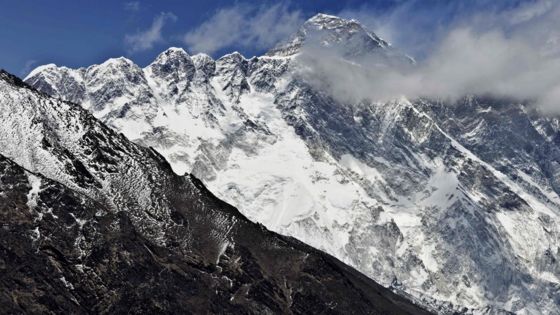
Foreign climbers and Sherpas on Mount Everest are concerned about the increasing theft of oxygen bottles from high camps.
They say it could threaten the lives of mountaineers because they each have a set supply for weather and traffic-related delays, as well as for the descent.
The concerns have been raised as the last groups of mountaineers wait for the weather to clear for their final push to the summit.
Experts say crowds of mountaineers, with many inexperienced climbers and unqualified guides, have also contributed to the situation.
"It is becoming a serious issue up there," Nima Tenji Sherpa, a mountain guide just back from Everest, told the BBC.
"I kept on hearing from expedition groups that their oxygen bottles had disappeared and that could be life-threatening - particularly when they have used up what they are carrying on their way up and they are still not on the summit yet, or they plan to use the stocked bottles on their way back."
Foreign climbers have posted about the theft on social media.
"Another seven bottles of oxygen have gone missing from our supply," wrote expedition leader Tim Mosedale on Facebook last Monday.
"This time from the South Col (camp four, the last camp before Everest at 7,900m)."
"Thankfully Pemba, having summited Lhotse yesterday, had enough energy to go to the South Col and check our supply and report his findings.
"But will it still be there when we arrive in a few days or will a few more bottles of magic air have gone missing?"
Earlier, Mr Mosedale had posted about a similar incident on Lhotse mountain near Everest.
"As long as we know that our oxygen is being used, we can get it resupplied. But to turn up and take it causes not only an issue for the summit team but also jeopardises the lives of other climbers."
Worrying trend
Although it was earlier reported that the death toll this season had reached 10, Nepalese authorities have said they can only confirm five deaths so far.
None of the deaths have been linked to the theft of oxygen bottles.
"What can you do when thieves break the locks of the tent and take away oxygen bottles, food and even cooking gas?" said Phurba Namgyal Sherpa, general secretary of the Nepal National Mountain Guides Association (NNMGA).
"It is becoming a trend.
"Because of such incidents, climbers have had to return without reaching the summit because when you learn that you no more have the life-saving bottles, the first thing you want to do is get back to the base camp."
Nima Tenji Sherpa said he had to give his oxygen bottle to his client in 2012 when they were on their way back because their stocks were stolen.
"We were descending and we saw that our bottles were gone and my client had already used up his oxygen, I took a risk and gave him my bottle.
"Fortunately we made it to the lower camps."
Precious bottles
According to the NNMGA, climbers use seven bottles of oxygen on average on their way up and down.
Each bottle has four litres of the life-saving gas and climbers can inhale it at different rates.
If they consume it at the highest rate of inhaling, a bottle can last up to five hours.
Mountaineers normally use the bottled oxygen above Camp Three, but they need to keep on climbing up and down to acclimatise before the final summit bid during the right weather window.
That means they might also use the bottles while camping in the higher camps.
Veteran Sherpa climbers said no-one has been caught stealing the bottles yet.
They suspect it could be groups that are ill-prepared and face life-threatening situations because they do not have adequate supplies.
They say there is also an increasing practice of stealing oxygen bottles from high camps and bringing them down to base camp to sell them.
"That market appears to be thriving at the base camp," said Nima Tenji Sherpa.
Government officials are aware of all this.
They say they are trying to introduce a new rule that will require each climber to have a Sherpa climber so that everyone has enough basic requirements such as oxygen bottles, medicine and food.
"We have proposed for this to be included in the mountaineering regulation but there has to be a cabinet-level decision on this," said an official at the tourism ministry, who did not wish to be named.
"Frequent changes in the government have meant that our ministry has been getting a new minister every few months, and issues like this don`t get addressed."
The government has given permission to nearly 400 mountaineers to climb Mount Everest this season.
Approximately 300 have already climbed the highest peak and the remainder are waiting for the weather to clear, say officials.


0 comments:
Post a Comment